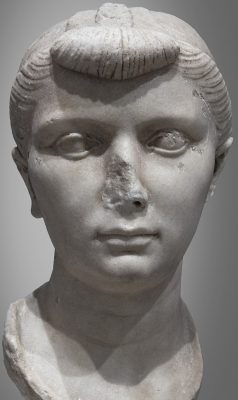Julia the Elder (39 BC-AD 14) was the daughter and only child of Roman emperor Augustus and Scribonia, his second wife. Her moniker “the Elder” distinguishes her from Julia the Younger, her daughter. She was also known as Julia Caesaris filia or Julia Augusti filia.
Early Life
Julia was born in Rome on the 30th of October, 39 BC. Augustus had not been granted the title “Augustus” yet and was known as “Gaius Julius Caesar Divi Filius.” However, historians of that time referred to him as “Octavian” until 27 BC. Octavian divorced Scribonia on the day of Julia’s birth and took Julia from her soon thereafter. In accordance with Roman custom, he claimed complete parental control over Julia.
As she grew old enough to learn how to be an aristocrat, she was sent to live with her stepmother, Livia Drusilla. Livia was the third wife of Octavian, who had divorced her husband to marry him. In addition to her regular studies, Julia was taught how to spin and weave, the usual skills expected of Roman women. She had a love for literature, which was encouraged by her father. Julia’s education was strict, and her social life was highly restricted. Octavian only allowed her to talk to people he had vetted. Despite this, he is said to have had a great affection for his daughter and made sure she had the best teachers available.
For aristocratic Roman women of that period, Julia was expected to marry and produce children who would continue the family line. Marriages were useful in creating alliances with other powerful families. In 37 BC, Octavian’s friends, Gaius Maecenas and Marcus Vipsanius Agrippa made an agreement with Octavian’s rival, Mark Antony. Part of the agreement was an engagement: Antony’s ten-year-old son Marcus Antonius Antyllus was to marry Julia, who was two years old at the time. However, the engagement did not result in marriage because a civil war erupted. Years later, Octavian and Agrippa defeated Antony and Cleopatra at the Battle of Actium in 31 BC, making Octavian the sole ruler and first emperor of the Roman Empire.
First Marriage
At the age of 14, Julia married her first cousin, 17-year-old Marcus Claudius Marcellus, in 25 BC. Marcellus was Augustus’ nephew and heir presumptive. Augustus was not present at the wedding as he was campaigning in Spain at the time, so he delegated the officiating of the event to Agrippa. Two years later, Marcellus died, leaving Julia a widow at a young age. The marriage never resulted in any offspring.
Second Marriage
Now 18 years old, Julia married Augustus’ close friend and most trusted general, Agrippa, in 21 BC. The arranged marriage was beneficial to Augustus, functioning as a political union that helped to solidify his position as emperor.
They lived in a villa near Farnesina in the district of Trastevere. Agrippa was the governor of Gaul from 20 BC to 18 BC, so Julia accompanied him to the Alps. Shortly after they arrived, Julia gave birth to their first child. The couple had five children together during their marriage. Three sons and two daughters, namely:
1) Gaius Caesar (born in 20 BC)
2) Lucius Caesar (born in 17 BC)
3) Marcus Agrippa Postumus (born in 12 BC)
4) Julia the Younger (born in 19 BC)
5) Agrippina the Elder (born in 14 BC)
In March 12 BC, Agrippa died suddenly in Campania. At this time, Julia was still pregnant with their youngest child. When he was born, Julia named the child Marcus Agrippa Postumus in her husband’s honor. While still in mourning, Augustus arranged for Julia to marry her stepbrother, Tiberius.
Third Marriage
Augustus wanted a way to keep Julia away from other potential suitors and political alliances so he married her off to Tiberius, his adopted son and heir. Augustus forced Tiberius to divorce his wife, Vipsania Agrippina, so that he could marry Julia. The couple wed in 11 BC, but it was an unhappy marriage. They resented each other, and their son died in infancy. Tiberius traveled to Rhodes around 6 BC, and the couple agreed to separate.
Exile and Death
In 2 BC, Julia was caught up in a scandal. She was arrested for adultery and treason. Julia was alleged to have had affairs with several men, including Appius Claudius Pulcher, Sempronius Gracchus, Antonius Iullus, and Cornelius Scipio, among others. Most of her many lovers were exiled and forced to commit suicide. Her father wrote her a letter in Tiberius’ name, declaring the marriage null and void. Augustus also accused her of conspiring against him. Julia was exiled to the island of Pandateria off the coast of Italy, where she lived in seclusion. She was prohibited from having any visitors unless Augustus expressly allowed it.
Around AD 4, she was transferred to Rhegium (modern-day Reggio di Calabria) on the mainland of Italy. She was granted a yearly income and was able to walk around the town. However, upon her father’s death in AD 14, Tiberius ascended to the Princeps, and Julia’s allowance was drastically removed. He banned her from leaving the house or having any visitors, and she eventually died at the age of 52. The cause of her death is unclear, but it is speculated that she may have died of malnutrition.
